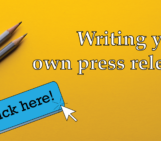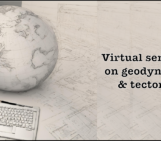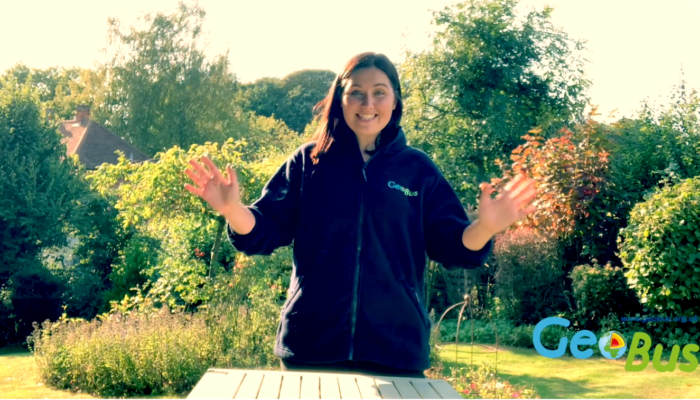
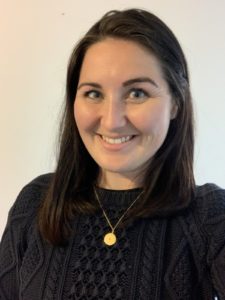
You can find Amy, the Geobus and UCL Earth Sciences on Twitter as @AmyEdg, @GeoBus_UCL and @UCL_ES.
Outreach is a fundamental part of science, aiming to inspire and attract the next generation of scientists. Amy Edgington from the Department of Earth Sciences at University College London gives us a glimpse behind the curtain of the GeoBus programme, a free mobile outreach programme that brings interactive Earth Science workshops into the classroom. This week, Amy tells us how the GeoBus had to put the brakes on in-person outreach, instead pivoting to virtual delivery during the pandemic.
Hello! I’m Amy and I am the Outreach Leader for the GeoBus UCL project. I imagine, the first question you may want to ask is, what is the GeoBus?
GeoBus is a free educational outreach project for schools and aims to provide research-led teaching packages. The original GeoBus was developed in 2012 by the School of Earth and Environmental Sciences at the University of St Andrews, Scotland, and leading on from the success of the Scottish GeoBus (they have now reached over 75,000 students), a London based GeoBus, GeoBus UCL was launched in 2016 as part of the NERC Deep Volatiles Project with additional funding from Schlumberger. We are now funded as part of the outreach efforts of the UCL Earth Sciences department and are actively seeking sponsorship to keep the GeoBus expanding and improving!
GeoBus is all about being hands-on, running interactive workshops within the classroom and showcasing the numerous and diverse links between Earth Science and the school curriculum. Rewinding the clock to the end of 2019, GeoBus UCL were driving around in a van full of experiments, rocks, fossils, and meteorites to primary and secondary schools across Greater London running exciting and energetic Earth Science workshops. This all had to change however in March 2020 when the global pandemic hit. We stopped all face-to face workshops and instead turned our skills to creating online content including lesson packs, videos, and short experiments that students could follow from home.
As the 2020/2021 academic year rolled closer, it was clear that face-to-face workshops were still not feasible and so we pivoted to virtual delivery. The next challenge was how do we create an engaging virtual workshop? The first ingredient was to make it live. The demonstrator is live on screen and can interact with the students, answering their questions, adapting the pace to suit the classes as well as adapt the workshop to suit the audience. Then, the second ingredient was activity kits. Activity kits for each individual student are sent to the school ahead of time and contain 3D glasses, 3D images and cut-out models for the students to use and interact with, creating a more tactile and interactive experience. The virtual workshops have been running since September 2020 and have reached close to 10,000 students in the past academic year alone. Whilst they have paused during the lockdowns, they are proving to not only provide a method of outreach during this uncertain time but also enabling the GeoBus to reach more schools and students than ever before. GeoBus demonstrators can be beamed into multiple classrooms with entire year groups able to take part simultaneously, providing maximum flexibility to suit a busy school timetable. Plus, we no longer have any limit on location – schools once too far away (as we are limited by travel time) have now been able to take part.
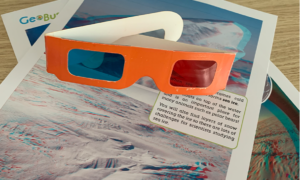
Figure 2: 3D glasses and 3D pictures from the Centre for Polar Observation and Modelling at UCL are sent to students as part of the virtual workshops.
So, what is my role in the GeoBus? My job is incredibly diverse, it can be anything from writing risk assessments, to building a seismometer out of Lego, but essentially, I develop and deliver Earth Science themed workshops to school students across the UK.
My career leading up to the GeoBus has taken many different turns. For a long time and throughout my undergraduate degree I have been fascinated by the planets, be it our own or the worlds within our Solar System. This wonder led me to UCL Earth Sciences for a PhD in the structure, composition and evolution of Mercury, the enigmatic endmember of the Solar System. It was during this time that I had the opportunity to get in involved in the outreach activities of the department including Soapbox Science and running workshops in local schools and I realised that I not only loved Earth science, but I loved teaching it.
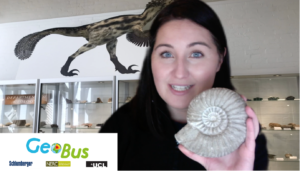
Figure 3: Showcasing fossils, rocks and meteorites as part of the GeoBus@Home pre-recorded workshops.
Following on from my PhD and a short post-doctoral position here at UCL I trained to become a Physics teacher (GCSE and A-Level). Teaching truly is among the most rewarding jobs you can have and the skills I built during my time as a teacher are those that carried me forward to become the Outreach Leader for the GeoBus. I now combine my enthusiasm for teaching with the research here at UCL. I discover more about Earth Sciences every day and work creatively alongside researchers to adapt leading research into lesson-sized and curriculum-embedded workshops.
Since joining the GeoBus in 2019 we have reached over 20,000 students across the UK and are showing no signs of slowing down. Virtual workshops were originally planned as a stop gap but have evolved into a new platform for delivering engaging outreach. Whilst face-to-face workshops will always be a part of the GeoBus this new virtual method warrants investment. It is a new string to the GeoBus bow and can provide a vital link between researchers and the future scientists and innovators sitting in the classrooms across the UK and beyond.



